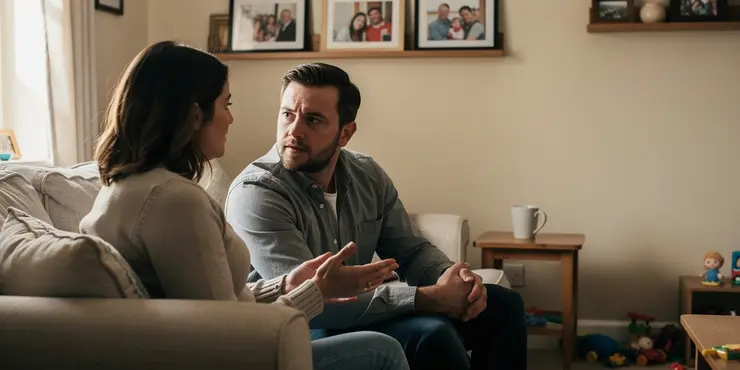
Find Help
More Items From Ergsy search
-
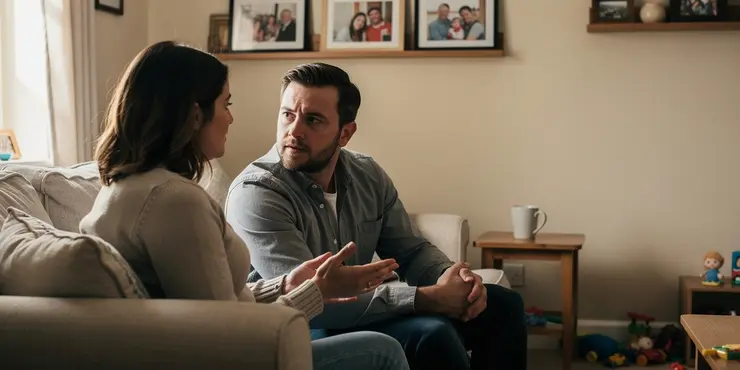
Is it safe for a partner of someone with HIV to have children?
Relevance: 100%
-

HIV and pregnancy | NHS
Relevance: 56%
-
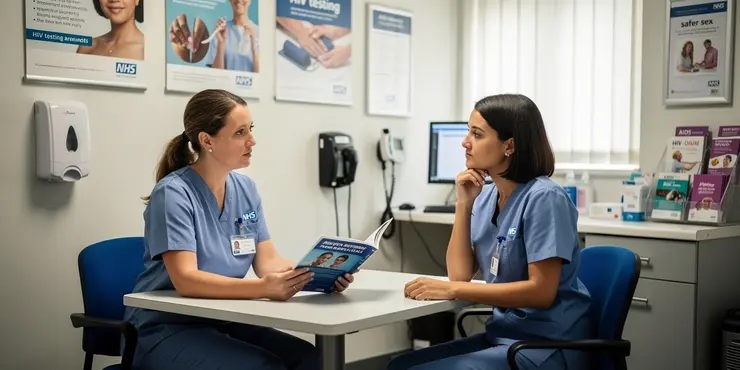
What is HIV / AIDS?
Relevance: 55%
-

Can people with HIV lead normal lives?
Relevance: 54%
-
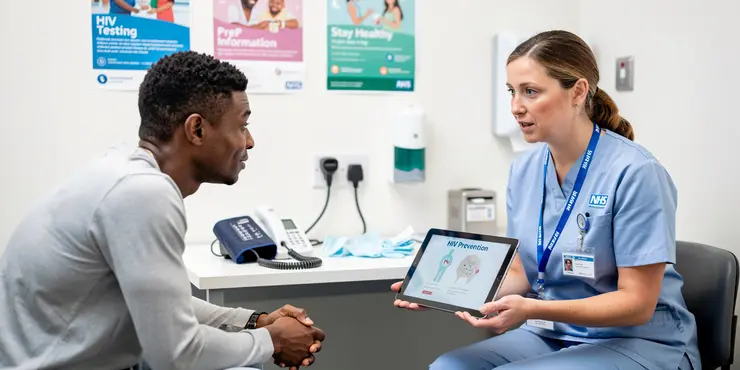
How can HIV be prevented?
Relevance: 53%
-
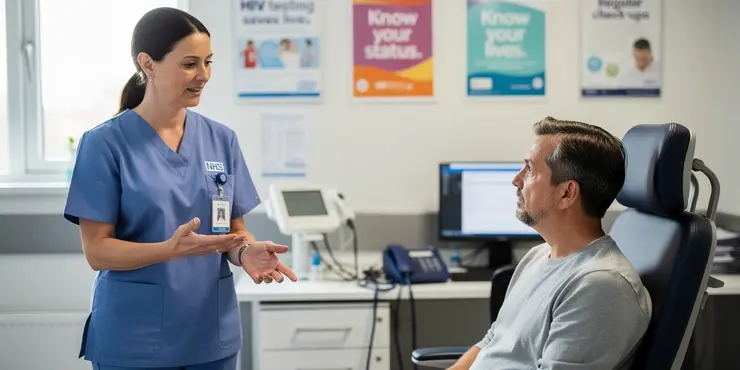
How often should someone get tested for HIV?
Relevance: 53%
-
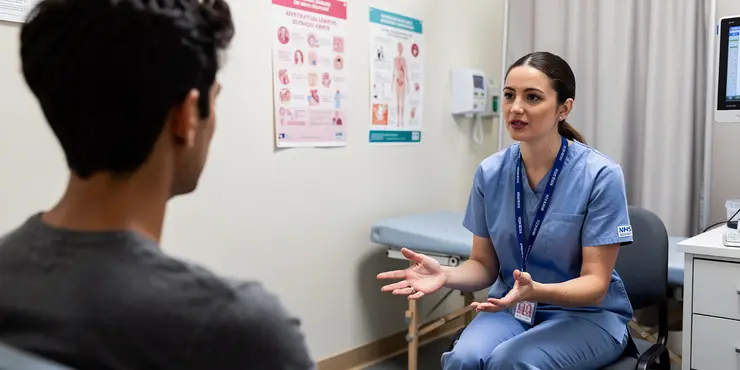
What is HIV?
Relevance: 52%
-
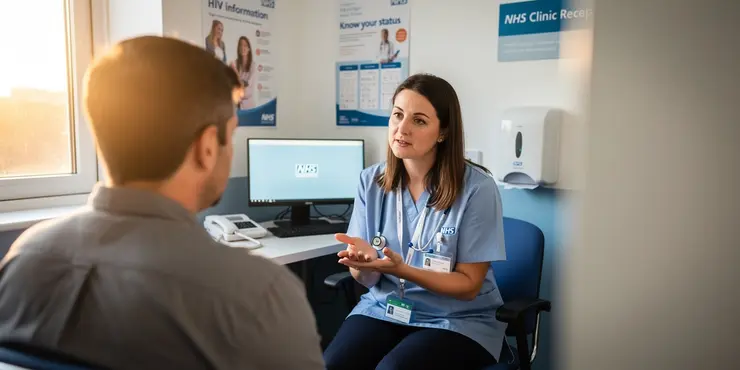
Is HIV only a concern for certain groups of people?
Relevance: 52%
-

Sexual Health - HIV Testing
Relevance: 50%
-
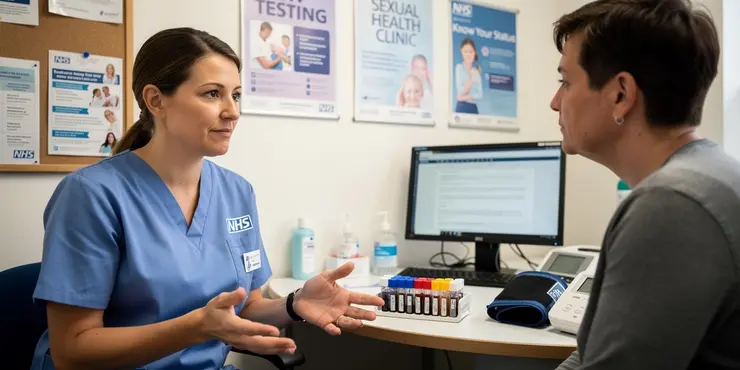
How is HIV transmitted?
Relevance: 50%
-
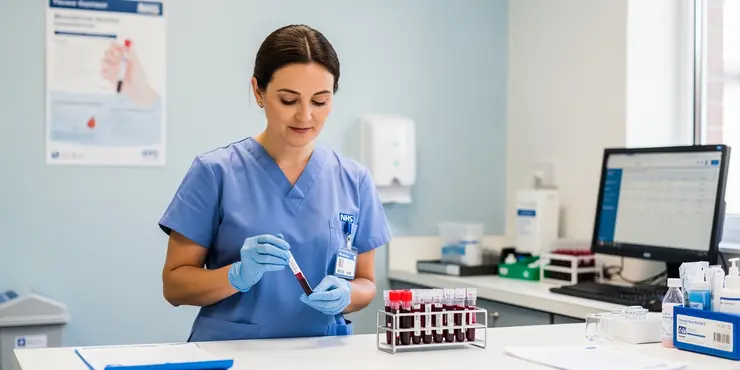
How is HIV diagnosed?
Relevance: 48%
-
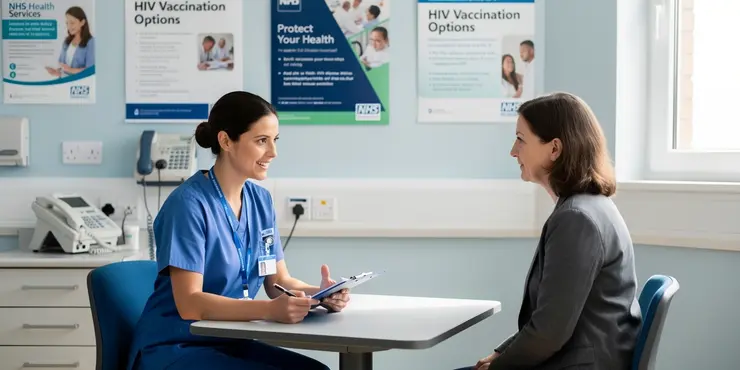
Are there vaccines available for HIV?
Relevance: 48%
-
What role does stigma play in the HIV epidemic?
Relevance: 46%
-
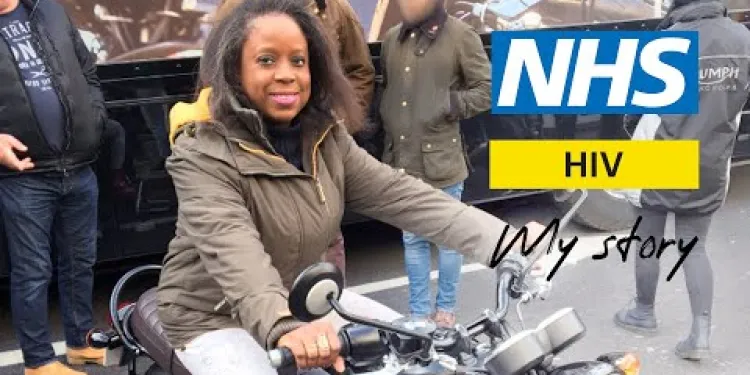
HIV - My Story - Florence | NHS
Relevance: 46%
-
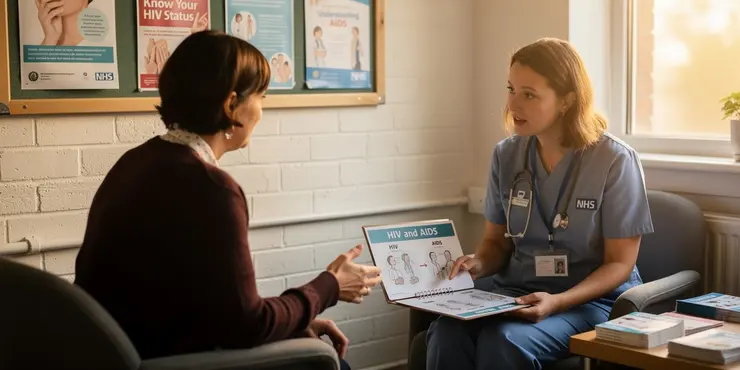
What is the difference between HIV and AIDS?
Relevance: 45%
-
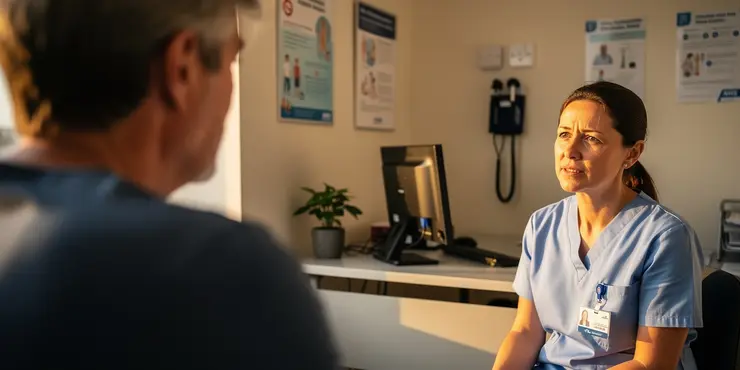
Can HIV be transmitted through insect bites?
Relevance: 43%
-
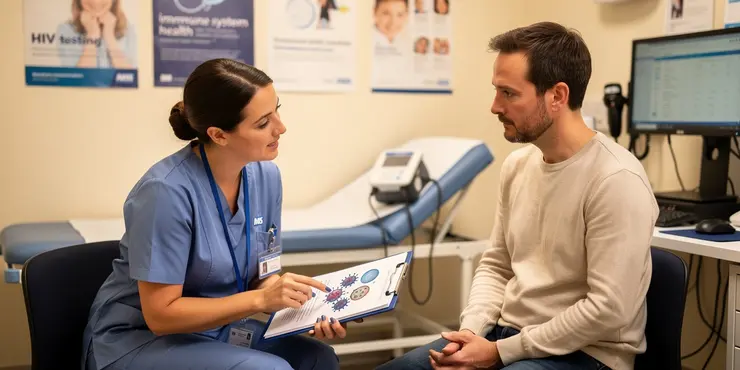
How does HIV affect the immune system?
Relevance: 43%
-
Can HIV be transmitted through blood transfusions?
Relevance: 43%
-

Can my partner be with me during the Caesarean section?
Relevance: 42%
-
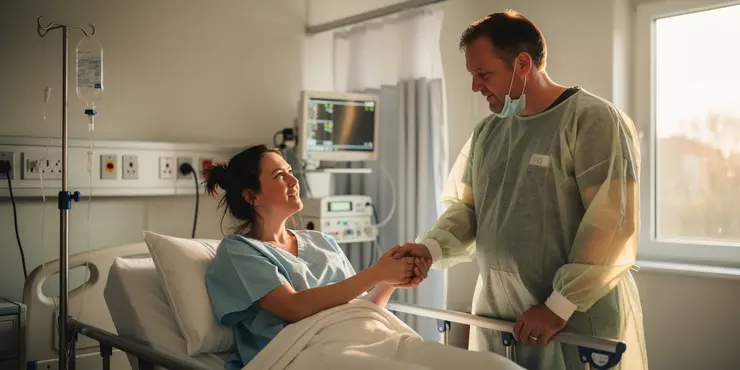
Can my partner be present during the C-section?
Relevance: 42%
-

What should I do if my partner dismisses my feelings of depression?
Relevance: 39%
-

How do I talk to my partner about how I’m feeling?
Relevance: 38%
-
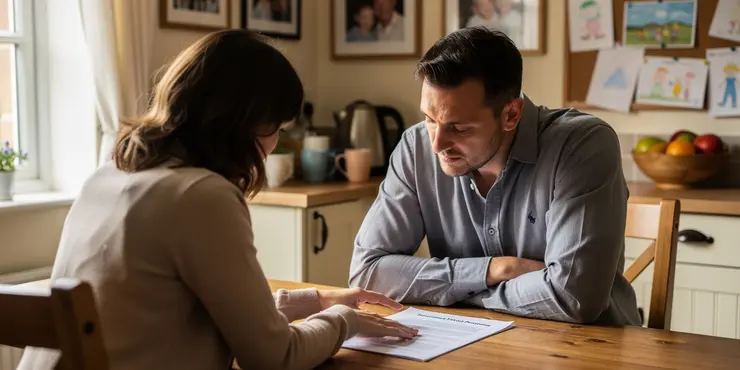
Is there any inheritance tax exemption for spouses or civil partners?
Relevance: 37%
-
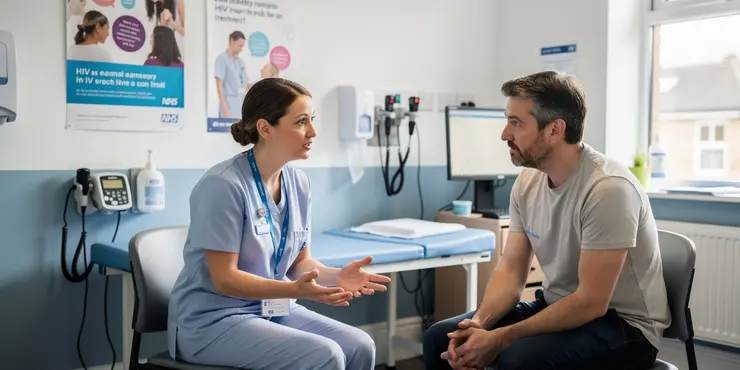
Can HIV be cured?
Relevance: 36%
-
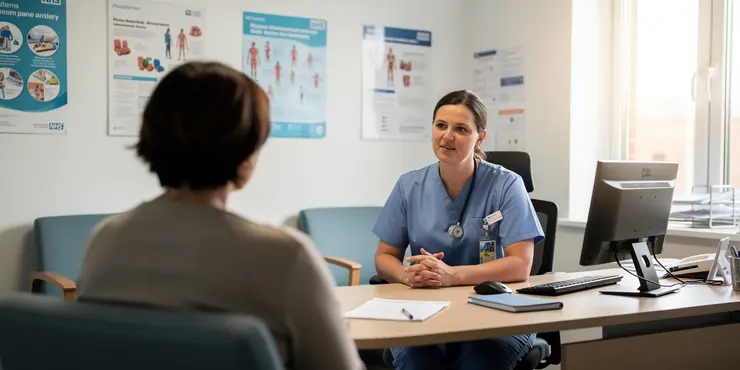
What are the symptoms of HIV?
Relevance: 35%
-
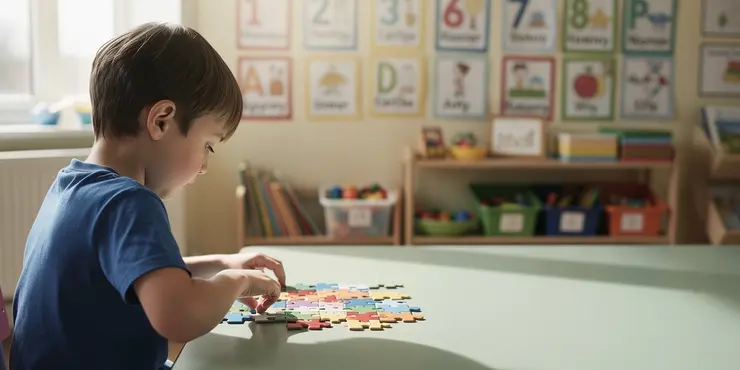
Who are SEND children?
Relevance: 28%
-
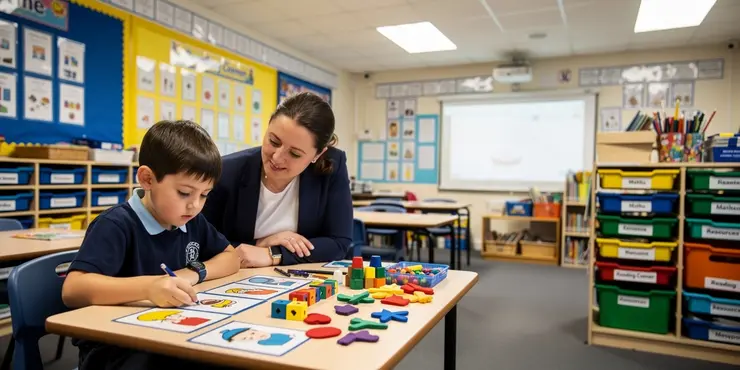
What are SEND children?
Relevance: 28%
-
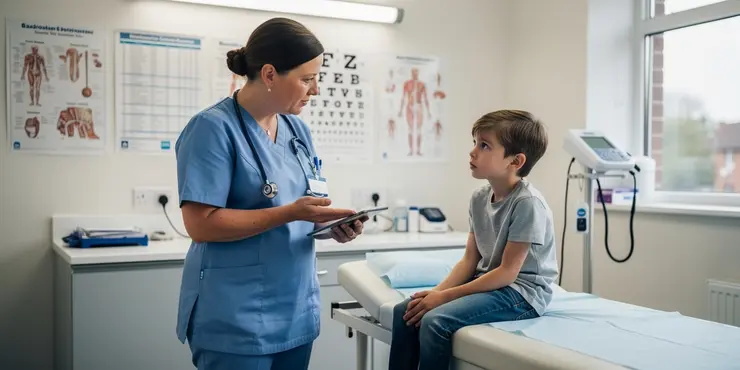
Is Baxdrostat suitable for children?
Relevance: 28%
-
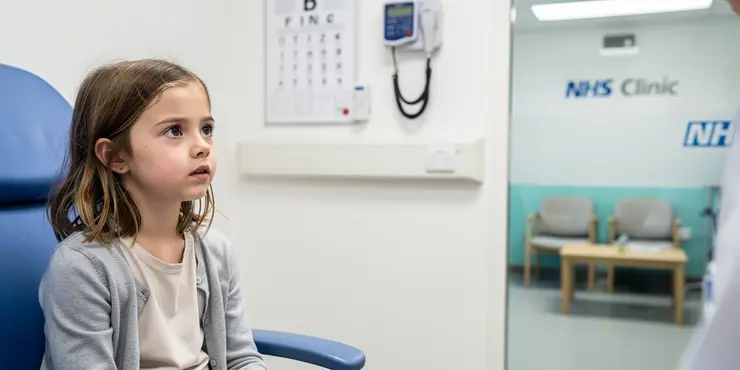
What is lupus in children?
Relevance: 28%
-
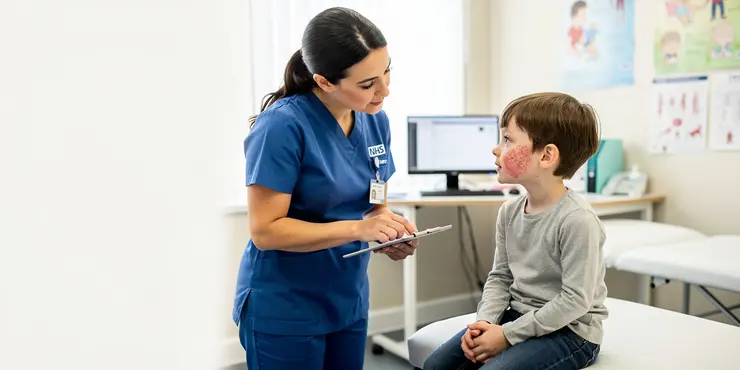
Lupus in children | NHS
Relevance: 28%
-
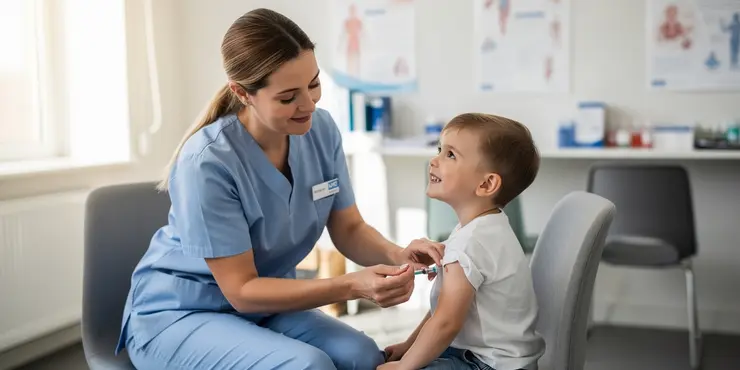
Children's Vaccination Schedule
Relevance: 28%
-

What causes lupus in children?
Relevance: 27%
-
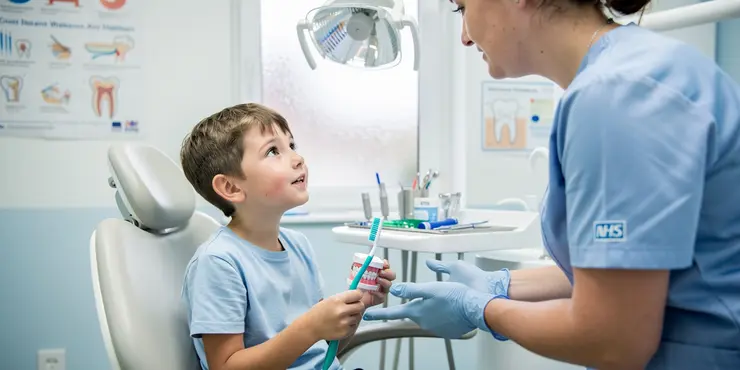
Is tooth decay common in children?
Relevance: 27%
-

Are there specific mobility equipment for children?
Relevance: 27%
-
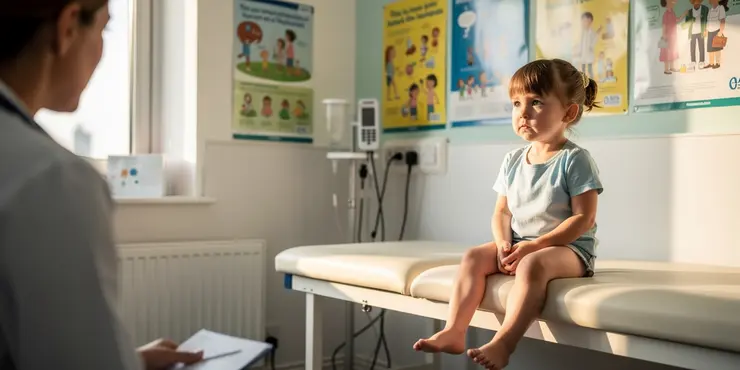
Can children use Mounjaro?
Relevance: 27%
-
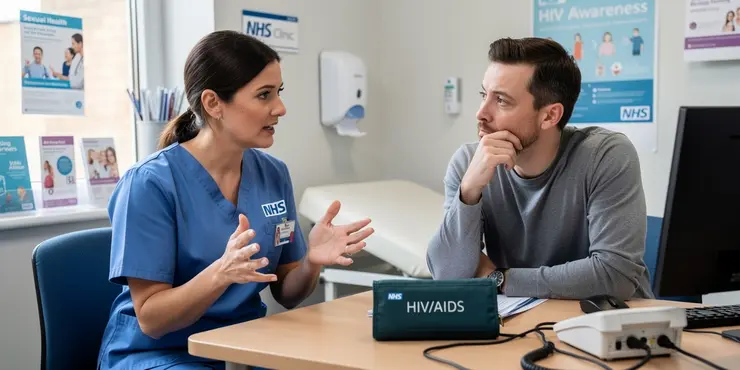
What is AIDS?
Relevance: 27%
-
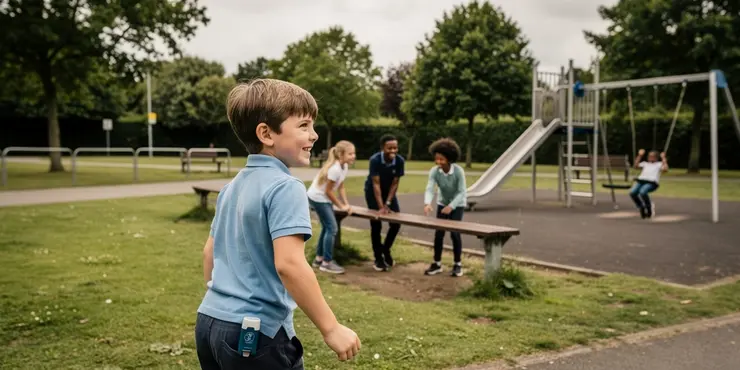
Can children outgrow asthma?
Relevance: 27%
-
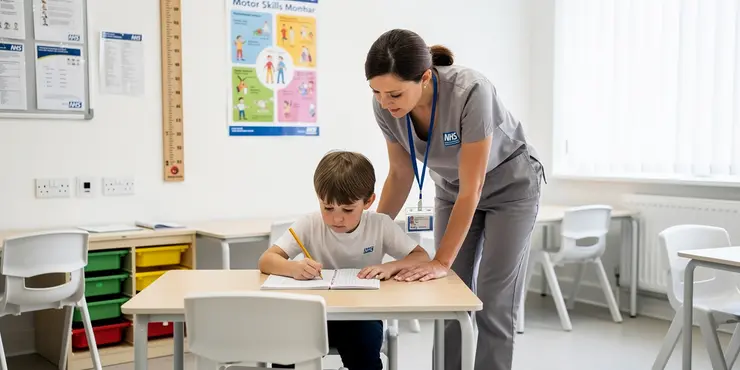
Children With Co-ordination Difficulties and Dyspraxia
Relevance: 27%
-
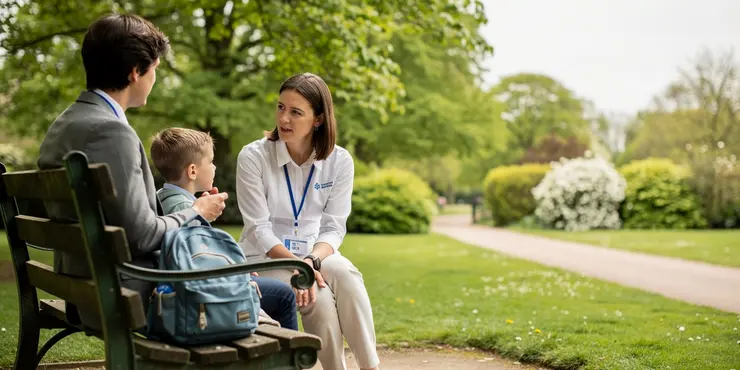
Understanding Mental Health in Children
Relevance: 27%
-
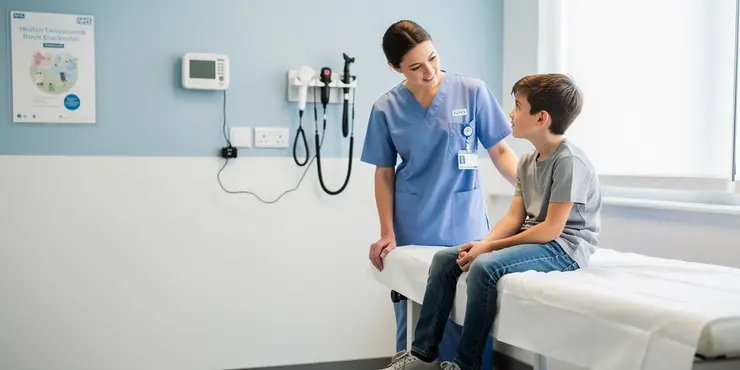
Can Wegovy be used by children?
Relevance: 27%
Understanding the Risk
For individuals in a relationship where one partner is HIV-positive, the decision to have children may come with concerns about safety and transmission. Fortunately, advancements in medical science have significantly reduced the risk of HIV transmission, making it safer for couples to consider starting a family.
Prevention of Transmission
One of the primary concerns is preventing the transmission of HIV to the uninfected partner and the baby. Effective antiretroviral therapy (ART) plays a crucial role in this. When an HIV-positive individual maintains an undetectable viral load due to consistent ART, the risk of sexual transmission is negligible, a concept supported by the "U=U" (Undetectable = Untransmittable) campaign.
Conception Methods
For couples wishing to conceive, there are several options depending on who is HIV-positive. If the woman is HIV-positive, conception through timed intercourse can be considered as long as her viral load is undetectable. If the male partner is HIV-positive, sperm washing is a technique that removes HIV from sperm, which can then be used for in vitro fertilisation (IVF) or intrauterine insemination (IUI).
Pregnancy and Child Safety
Once pregnant, an HIV-positive woman should continue her ART to maintain a low viral load, thereby minimizing the risk of mother-to-child transmission. In the UK, with appropriate medical care, the risk of transmitting HIV from mother to baby can be reduced to less than 1%. This care includes regular health check-ups and following the medical guidance provided by healthcare professionals.
Postnatal Care
After birth, the baby may be given a short course of antiretroviral medication for extra protection. Breastfeeding is another consideration, as HIV can be transmitted through breast milk. In the UK, formula feeding is recommended to completely eliminate this risk.
Consulting Healthcare Professionals
It is crucial for couples considering parenthood where one partner is HIV-positive to consult with healthcare professionals. This ensures that both partners receive appropriate advice and access to necessary treatments throughout the process. Comprehensive care and collaboration with specialists can support a safe and successful outcome for the entire family.
Conclusion
In the UK, with modern medical advancements and the right precautions, it is indeed safe for the partner of someone with HIV to have children. By maintaining an undetectable viral load, using appropriate conception methods, and adhering to medical advice, couples can minimise risks and focus on building their family with confidence.
Understanding the Risk
If one partner has HIV, having a baby can seem scary. But doctors have found ways to make it much safer. This helps couples decide if they want to have children.
Stopping the Spread of HIV
Stopping HIV from spreading to the other partner or the baby is very important. Taking HIV medicine can help a lot. If the HIV-positive partner takes the medicine and the virus can't be found in their body, they are not likely to give HIV to others. This is the idea behind "U=U," which means "Undetectable = Untransmittable."
Ways to Have a Baby
If the woman has HIV, she can try to get pregnant when her HIV is very low because of her medicine. If the man has HIV, doctors can clean his sperm to take out the virus. Then they can use the sperm to help start a pregnancy with special doctor tools.
Being Pregnant and Baby's Safety
If a woman with HIV is pregnant, she should keep taking her medicine. This keeps the virus low and helps protect the baby. In the UK, with good medical care, there is less than a 1% chance the baby will get HIV from the mother. Women should go to the doctor often and listen to their advice.
Taking Care of the Baby After Birth
After the baby is born, they might get a little bit of HIV medicine too. It's safer not to breastfeed because HIV can be in breast milk. In the UK, using baby formula can completely stop this risk.
Talking to Doctors
Couples where one has HIV should talk to doctors about having a baby. Doctors can give advice and help them get the right treatment. This helps keep everyone safe and healthy.
Conclusion
In the UK, with new medicine and help from doctors, it is safe for someone with a partner who has HIV to have children. Keeping the virus low, using the right ways to get pregnant, and listening to doctors make it safe to have a family.
Frequently Asked Questions
Can we have children if one of us is HIV-positive?
Yes, it is possible to have children safely even if one partner is HIV-positive, with appropriate medical care and interventions.
What steps can we take to prevent HIV transmission during conception?
Using antiretroviral therapy (ART), achieving an undetectable viral load, and considering assisted reproductive technologies can help prevent transmission.
What does 'undetectable viral load' mean?
An undetectable viral load means the level of HIV in the blood is so low that it cannot be detected with standard tests, significantly reducing the risk of transmission.
Is it necessary for the HIV-positive partner to be on ART?
Yes, ART is crucial as it helps maintain an undetectable viral load, reducing the risk of transmitting HIV to the partner or child.
What is PrEP and how can it help?
PrEP (Pre-exposure Prophylaxis) is a medication taken by the HIV-negative partner to reduce their risk of getting HIV.
Can artificial insemination be used to prevent HIV transmission?
Yes, artificial insemination can be used when the female partner is HIV-positive to prevent male partner exposure, and sperm washing is used if the male partner is HIV-positive.
What is sperm washing?
Sperm washing is a technique used to separate sperm from seminal fluid, which can contain HIV, allowing the safe use of sperm for conception.
Is it safe to conceive naturally if the HIV-positive partner has an undetectable viral load?
Conceiving naturally is possible with an undetectable viral load, as the risk of transmission is extremely low, but this should be discussed with a healthcare provider.
What role does a healthcare provider play in this process?
Healthcare providers offer guidance on safe conception methods, monitor health and viral loads, and provide necessary treatments and interventions.
Are there special considerations during pregnancy for an HIV-positive mother?
Yes, maintaining ART during pregnancy is crucial, and special care is taken to prevent transmission to the baby during delivery.
Can an HIV-positive parent have a healthy, HIV-negative child?
Yes, with proper medical care, including ART, the chances of having an HIV-negative child are very high.
Should an HIV-positive mother deliver via C-section?
A C-section may be recommended in certain situations, but if the viral load is undetectable, a vaginal delivery may be possible.
Is breastfeeding safe if the mother is HIV-positive?
Breastfeeding poses some risk, but it can be minimized with ART. Discuss with a healthcare provider for recommendations based on your specific situation.
What measures can be taken during delivery to reduce HIV transmission?
Avoiding unnecessary invasive procedures and ensuring the mother's viral load is suppressed help reduce transmission risk during delivery.
What follow-up care is needed for the child after birth?
The child will need HIV testing and may be given medications for a few weeks to prevent infection.
How often should the HIV-positive partner's viral load be monitored?
Regular monitoring as advised by a healthcare provider is essential to ensure the viral load remains undetectable.
Can HIV be transmitted to a child after birth?
While rare with modern treatments and proper precautions, there is some risk through breastfeeding, which needs careful planning.
What emotional support resources are available for couples in this situation?
Support groups, counseling, and therapy are available to help couples navigate the emotional aspects of living with HIV.
Is it necessary to disclose HIV status to others when planning to have a child?
Disclosure is a personal decision, but it might be helpful to inform healthcare providers involved in the pregnancy and child's care.
What should couples know about legal rights regarding HIV and parenthood?
Familiarize yourself with local laws about disclosure and discrimination to understand your rights as parents living with HIV.
Can we have a baby if one of us has HIV?
Yes, you can have a baby even if one of you has HIV. It is important to talk to a doctor. They can help you and your partner stay healthy.
There are ways to make sure the baby does not get HIV. The doctor will tell you the best ways.
Using medicines can keep both parents healthy. It can also stop the virus from spreading to the baby.
Support tools and techniques:
- Visit a health clinic to talk to a doctor.
- Join a support group for parents with HIV.
- Read books and find information from trusted sources to learn more.
You can still have children safely if one person has HIV. You just need the right medical help and treatments.
How can we stop HIV from spreading when trying to have a baby?
Here are some simple ways to help:
- Talk to a Doctor: A doctor can give advice and help make a plan.
- Use Medicine: Medicine can keep HIV from spreading. The doctor can say which medicines to use.
- Use Protection: Sometimes, using protection like condoms can help.
- Test for HIV: Both people can get tested to know if they have HIV.
Some tools can also help:
- Pill Reminders: Reminders can help you take your medicine on time.
- Support Groups: Talking to others who understand can be helpful.
Taking special medicine called ART, making sure the virus is very low in your body, and using special ways to have babies can help stop the spread of the virus.
What does 'undetectable viral load' mean?
'Undetectable viral load' means there is a very tiny amount of a virus in the body. It is so small that doctors cannot find it with their tests.
This is good because it means the virus is not easily spread to other people. It also means the medicine is working well.
If you want help understanding your health or doctor's words, you can:
- Ask your doctor to explain in simple words.
- Write down questions you have before you see the doctor.
- Bring a friend or family member to help listen.
If someone has HIV, but the amount is very, very small, it can't be found by regular tests. This makes it much harder for them to pass it to someone else.
Does the partner with HIV need to take ART medicine?
Yes, ART is very important. It helps keep the virus very low, which means it is hard to spread to other people like your partner or child.
Here are some tips to help:
- Use simple words to talk about how ART helps.
- Use pictures to show what ART does in the body.
- Ask someone to read with you if it is hard to understand.
- Take your medicine every day to keep the virus low.
What is PrEP and how does it help?
PrEP is a pill you can take. It helps stop you from getting HIV. HIV is a virus that makes you very sick.
PrEP is good for people who don't have HIV but might catch it. You take it so you stay healthy.
Here are some ways PrEP can help you:
- Protects your body from HIV.
- Helps you stay healthy.
- You take it once every day.
If you are worried about HIV, talk to a doctor. They can tell you if PrEP is good for you.
Some people find it helpful to use a calendar or phone reminders. This helps them remember to take PrEP every day.
PrEP is a medicine. It helps people who do not have HIV stay safe from it. If one partner does not have HIV, they can take PrEP to protect themselves.
Can we use special methods to stop HIV when having a baby?
There is a way to help parents with HIV have healthy babies. It's called artificial insemination. This means putting sperm (the tiny cells from a dad) into a mom without them being close. This can help stop HIV, a sickness, from passing to the baby.
If you have questions or need help, talk to a doctor or nurse. They know a lot about this and can help you. There are also tools like picture books or videos that explain things well.
Yes, you can use a special way to help a woman get pregnant if she has HIV. This way keeps the man safe. If the man has HIV, his sperm can be cleaned to help keep the baby safe.
What is sperm washing?
Sperm washing is a way to clean sperm.
This helps to take out things that are not needed.
Doctors do this to help with having babies.
If you need help reading, try using a reading tool. They can read the words out loud for you.
Sperm washing is a way to clean sperm. It takes sperm out of the fluid it swims in, which can have HIV. This makes it safe to use the sperm to help make a baby.
Is it safe to have a baby naturally if the partner with HIV has a very low virus level?
You can have a baby naturally if the virus in your body is so low it can't be seen. This means the chance of passing the virus is very, very small. But, you should talk to a doctor about it.
What does a healthcare worker do in this process?
A healthcare worker helps people get better. They give medicine, check health, and give advice. They make sure you are safe and healthy.
You can use pictures to understand better. Ask someone if you do not understand.
Doctors and nurses help people have babies safely. They check your health and help with any treatments you need. They also watch your virus levels to keep you healthy.
Things to Think About When an HIV-Positive Mother is Pregnant
If a mother has HIV and is going to have a baby, there are important things to do to keep both the mother and baby healthy.
- See a doctor often. Doctors can help take care of both the mother and the baby.
- Take medicine every day. This medicine can help keep the HIV virus from spreading to the baby.
- Eat healthy food and get lots of rest. This helps the mother stay strong and healthy.
- Talk to a support group or counselor. They can help with feelings and give advice.
These steps can help make sure the mother and baby are as healthy as possible.
Yes, it is very important to keep taking your medicine during pregnancy. This helps stop the virus from passing to the baby during birth. Doctors and nurses will help keep your baby safe.
Can a parent with HIV have a healthy baby without HIV?
Yes, a parent with HIV can have a healthy baby who does not have HIV.
Here are some ways to make it safe:
- Go to the doctor often during pregnancy.
- Take medicine to stop HIV. This helps keep the baby safe.
- Have a doctor help with the birth. This can stop the spread of HIV.
- Do not breastfeed the baby. Use baby formula instead.
Remember, seeing the doctor and taking medicine is important. They will help keep the baby healthy.
Yes, with the right medical help, like ART, it is very likely to have a child without HIV.
Should a mom with HIV have her baby by C-section?
When a mom has HIV, doctors might suggest having the baby by C-section. A C-section is an operation to help the baby come out safely.
Doctors do this to stop HIV from going to the baby. It's important for the mom to talk with her doctor about what is best for her and the baby.
Using tools like videos or pictures can help understand this better. Also, asking a helper or friend to come to doctor visits can be a good idea.
Sometimes, doctors might say you need a C-section. But if the virus can't be found in your body, you might be able to have a normal birth.
Can a mom with HIV safely breastfeed her baby?
Moms with HIV can pass HIV to their baby through breast milk.
Doctors may suggest using baby formula instead of breastfeeding.
Talk to a doctor for the best way to feed your baby safely.
Using medicine can help, so ask your doctor about this too.
Use pictures, charts, or a helper to understand what the doctor says.
Breastfeeding can have some risks, but you can make it safer with special medicine called ART. Talk to your doctor or nurse. They will give you the best advice for you and your baby.
How can we stop HIV from spreading when a baby is born?
Doctors try not to do things that don't need to be done during birth. This can help stop a mom from passing a virus to her baby. It is also important to keep the mom's virus level low. This helps keep the baby safe.
What care does the baby need after being born?
The child will need to have an HIV test. They might also take some medicine for a few weeks to stop them from getting sick.
How often should the HIV-positive partner's viral load be checked?
If your partner has HIV, you need to check their viral load. The viral load is the amount of HIV in the blood. Checking it helps doctors see how the treatment is working.
It is important to check the viral load every 3 to 6 months. This helps keep your partner healthy.
If you have trouble reading or understanding, ask someone you trust to help you. You can also use text-to-speech tools to listen instead of reading.
Your doctor or healthcare worker will tell you when to check the virus in your body. This is important to make sure the virus stays low and doesn't show up in tests.
Can a baby get HIV after they are born?
Yes, a baby can get HIV after birth. This can happen through:
- Breastfeeding from a mother who has HIV.
- Being cared for or fed by someone who has HIV.
It is important for the parent or caregiver to talk to a doctor. They can give advice on how to keep the baby safe from HIV.
Pictures or videos might help make this information clearer. You can also use apps or online tools that read the text out loud.
Breastfeeding can be safe with the right care, but there is still a small risk. Make sure you talk to a doctor or nurse to keep it safe.
What help is there for couples who need support with their feelings?
There are people and groups who can help couples understand and deal with feelings when living with HIV. They offer support, advice, and a place to talk about their emotions.
Do you need to tell others if you have HIV when you want to have a baby?
If you have HIV and want to have a baby, you might wonder if you need to tell other people.
Here are some things to think about:
- You should talk to your doctor. They can help you and give good advice.
- If you are planning your family, it's important to be safe and healthy. Your doctor can guide you on what to do.
- If you have a partner, it is important to talk to them about your HIV status. This helps both of you stay healthy.
Remember, talking to the right people can help you make good choices for you and your baby.
Telling people about your situation is up to you. But it can be a good idea to tell doctors or nurses who help with the pregnancy and the baby's care.
What do couples need to know about legal rights, HIV, and having children?
If you and your partner want to have a baby and one or both of you have HIV, it is important to understand your legal rights.
Here are some things you should know:
- You have the right to get help from doctors who understand HIV.
- There are medicines that help people with HIV have healthy babies.
- Talk to experts who know the law about HIV and families.
Support tools that can help:
- Visit health websites that explain legal rights in simple words.
- Talk to a healthcare worker who knows about HIV and can help you understand.
- Join a support group for people with HIV to share experiences.
Learn about the rules in your area that talk about telling others and being treated unfairly if you have HIV. This will help you know your rights as parents with HIV.
Useful Links
This website offers general information and is not a substitute for professional advice.
Always seek guidance from qualified professionals.
If you have any medical concerns or need urgent help, contact a healthcare professional or emergency services immediately.
Some of this content was generated with AI assistance. We’ve done our best to keep it accurate, helpful, and human-friendly.
- Ergsy carfully checks the information in the videos we provide here.
- Videos shown by Youtube after a video has completed, have NOT been reviewed by ERGSY.
- To view, click the arrow in centre of video.
- Most of the videos you find here will have subtitles and/or closed captions available.
- You may need to turn these on, and choose your preferred language.
- Go to the video you'd like to watch.
- If closed captions (CC) are available, settings will be visible on the bottom right of the video player.
- To turn on Captions, click settings .
- To turn off Captions, click settings again.
More Items From Ergsy search
-

Is it safe for a partner of someone with HIV to have children?
Relevance: 100%
-

HIV and pregnancy | NHS
Relevance: 56%
-

What is HIV / AIDS?
Relevance: 55%
-

Can people with HIV lead normal lives?
Relevance: 54%
-

How can HIV be prevented?
Relevance: 53%
-

How often should someone get tested for HIV?
Relevance: 53%
-

What is HIV?
Relevance: 52%
-

Is HIV only a concern for certain groups of people?
Relevance: 52%
-

Sexual Health - HIV Testing
Relevance: 50%
-

How is HIV transmitted?
Relevance: 50%
-

How is HIV diagnosed?
Relevance: 48%
-

Are there vaccines available for HIV?
Relevance: 48%
-
What role does stigma play in the HIV epidemic?
Relevance: 46%
-

HIV - My Story - Florence | NHS
Relevance: 46%
-

What is the difference between HIV and AIDS?
Relevance: 45%
-

Can HIV be transmitted through insect bites?
Relevance: 43%
-

How does HIV affect the immune system?
Relevance: 43%
-
Can HIV be transmitted through blood transfusions?
Relevance: 43%
-

Can my partner be with me during the Caesarean section?
Relevance: 42%
-

Can my partner be present during the C-section?
Relevance: 42%
-

What should I do if my partner dismisses my feelings of depression?
Relevance: 39%
-

How do I talk to my partner about how I’m feeling?
Relevance: 38%
-

Is there any inheritance tax exemption for spouses or civil partners?
Relevance: 37%
-

Can HIV be cured?
Relevance: 36%
-

What are the symptoms of HIV?
Relevance: 35%
-

Who are SEND children?
Relevance: 28%
-

What are SEND children?
Relevance: 28%
-

Is Baxdrostat suitable for children?
Relevance: 28%
-

What is lupus in children?
Relevance: 28%
-

Lupus in children | NHS
Relevance: 28%
-

Children's Vaccination Schedule
Relevance: 28%
-

What causes lupus in children?
Relevance: 27%
-

Is tooth decay common in children?
Relevance: 27%
-

Are there specific mobility equipment for children?
Relevance: 27%
-

Can children use Mounjaro?
Relevance: 27%
-

What is AIDS?
Relevance: 27%
-

Can children outgrow asthma?
Relevance: 27%
-

Children With Co-ordination Difficulties and Dyspraxia
Relevance: 27%
-

Understanding Mental Health in Children
Relevance: 27%
-

Can Wegovy be used by children?
Relevance: 27%


